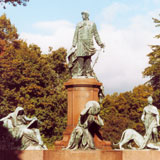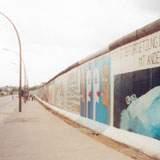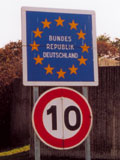History

Charlemagne, or Charles the Great, extended the Frankish Empire from 768 and was the Emperor of the Holy Roman Empire from 800 to 814, which included what is now modern-day Germany. In 1871 Otto von Bismarck founded the German Empire and became its first chancellor. From 1815 Germany had been split into small individual states after the fall of the first German Empire. After the end of the First World War (1914-1918), the empire was followed by the Weimar Republic, the first German democracy.
Economic and political turmoil and, in the main part, the lack of any democratic will on the part of the elite class, led to the collapse of the Weimar Republic on the 30th January 1933 when Adolf Hitler was appointed Chancellor of Germany. The National Socialist (Nazi) dictatorship that followed was responsible for genocide, the holocaust and the Second World War (1939-1945). Germany surrendered on the 8th of May 1945 and the allied victors – the Soviet Union, USA, Great Britain and France – took control of Germany and divided the country into four zones of occupation.
Under the auspices of France, Britain and the USA, the Federal Republic of Germany was founded on the 23rd of May 1949 in the three western zones. The new FRG was a parliamentary democracy with a written constitution known as the Basic Law ("Grundgesetz"). As the first federal chancellor, Konrad Adenauer had an enormous influence on the founding years of the FRG.
In the Soviet zone to the East, the German Democratic Republic was founded on the 7th of October 1949. The constitution of the GDR was on paper a parliamentary democracy but the state was dominated by the monopoly of power held by the governing socialist/communist party – the SED.

The defining symbol of the East-West conflict during the 1950s and 1960s was the Berlin Wall, which was erected in 1961. Willy Brandt’s and Walter Scheel’s government policy of "Ostpolitik" (encouraging closer relations with East Germany) in the 1970s finally brought East and West Germany closer together. The Soviet Union with "Glasnost" and "Perestroika" brought about political change, signalled the end of the Iron Curtain and brought about the downfall of the political system in East Germany in the late 1980s.
A flood of East German refugees since August 1989 and the so-called "Monday Demonstrations" for democratic reform in East Germany culminated in the fall of the Berlin Wall on the 9th of November 1989. The first free elections in the GDR took place in March 1990. Monetary, Economic and Social Union was established between East and West Germany on the 2nd of July 1990 and, on the 3rd of October 1990, Germany was reunited. Chancellor Helmut Kohl played a substantial role in the reunification of Germany and the growing together of Europe.
National Anthem
The lyricist Hoffmann von Fallersleben (1798-1874) wrote the "Lied der Deutschen" (Song of the Germans) in August 1841. The melody is based on a composition from Joseph Haydn (1732-1809) written in 1796. On 11 August 1922, the first social democratic government officially introduced the "Lied der Deutschen" as the national anthem. Today, the third verse is sung at official occasions.
Haus der Geschichte
The museum "Haus der Geschichte der Bundesrepublik Deutschland" in Bonn details the history of the Federal Republic of Germany starting in 1945. The Internet address is: ![]() www.hdg.de.
www.hdg.de.
Willy-Brandt-Allee 14
53113 Bonn
Tel: 0228 / 9165-0
Unter den Linden 2
10117 Berlin
![]() www.dhm.de
www.dhm.de
"Fragen an die deutsche Geschichte" (Questions on German History)
Am Gendarmenmarkt
10117 Berlin
Admission free
Immigration to Germany

There has always been immigration to Germany. The reasons for doing so have varied throughout the ages. Some came as workers or traders, others as refugees. One of the most well known and largest immigrant groups in German history were the "Huguenots", a persecuted religious community who fled France in the 17th century. Another grouping in the 19th century were the so-called "Ruhr Poles": immigrants of Polish background who worked mainly in the coal mines in the Ruhr Basin, many of whom stayed and settled in Germany.
Since the end of the 1950s, many different immigrants came to work in post-war Germany as a result of special agreements (so called "Anwerbe-Abkommen"). West Germany experienced the "Wirtschaftswunder" (the post-war economic boom) and workers were needed to keep the factories running. Agreements for workers were signed with Italy, Turkey, Yugoslavia and Morocco among others. In the GDR, workers from Vietnam and African states were invited to come. When travel restrictions were eased after the fall of the Iron Curtain at the end of the 1980s, many ethnic Germans ("Aussiedler") returned, mostly from former Eastern Bloc countries. Between 1990 and 2000, more than 2 million "Aussiedler" came to Germany. Another large immigrant group are the politically persecuted and refugees of war.
Today, more than 7 million foreigners live in Germany, almost 9 per cent of the population. One quarter were born in Germany. The majority of foreigners live in the former West Germany and most have been there for ten years or more.
Each year around 800,000 people move to Germany and almost 700,000 emigrate. Some stay for a short time, others for life. Germany is described as a country of immigration ("Einwanderungsgesellschaft"). Immigrants and their children influence part of the cultural and public life.
Numerous firms have been founded by immigrants and their business activities comprise much more than the ubiquitous restaurants which can be seen everywhere. Immigrants have an ever-growing representation in the service sector and the commercial economy.
Many immigrants are also actively involved in trade unions. The number of people of non-German origin active in politics, communal parliaments, state parliaments and the Bundestag (the German parliament), is, however, relatively small.
